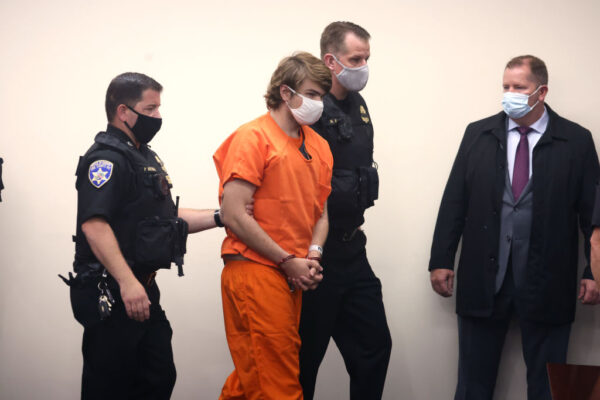New York prosecutors received more time to build their case against the Buffalo suspect on Thursday as a grand jury indicted him for first-degree murder in the killing of 10 Black people at an Upstate supermarket Saturday.
Payton Gendron, who has been dubbed “the most hated man in the country,” could also be facing state and federal hate crime charges.

Since the killings, national and state politicians have sprung into action, pushing policies to combat domestic terrorism.
Despite overwhelming opposition from Republicans, House Democrats passed a bill on Wednesday that targets domestic terrorism.
Supporters say the Domestic Terrorism Prevention Act would prevent future shootings like Saturday’s massacre and allow the U.S. Department of Justice to respond more “effectively” to domestic terrorism.
Critics argue it focuses only on white supremacy offenses and gives the DOJ the ability to infringe on constitutional rights. All but one GOP House member voted against the measure Wednesday, including U.S. Rep. Chris Jacobs of Buffalo.
“We cannot allow our country to turn a blind eye to white supremacist vigilantes. Their hatred impacts all of us,” House Majority Whip James E. Clyburn said during floor debate. “While the gunman in Buffalo was aiming for people who looked like me, others who did not look like me fell victim to this evil act.”
The federal measure changes the current law enforcement outlook on domestic terrorism to add a special focus on racially motivated offenses. It creates an office in the DOJ, FBI and Department of Homeland Security to monitor, investigate and prosecute domestic terrorism.
The bill would require mandatory training in identifying and combating white supremacism, including stopping “domestic terrorists from infiltrating law-enforcement agencies” and the military. The federal agencies would also be required to publish biannual reports on the level of threat supremacists pose to the nation.
“This legislation will provide federal agencies with necessary tools to ensure that peace and justice prevail,” Clyburn said.
Critics of the act argue that there are already existing laws that address terrorist activity in America. They also believed that by focusing on just one type of domestic terrorism, the measure would divert funds from other terrorist threats.
“This legislation expands the federal bureaucracy, it ignores new and evolving terrorist threats, and it makes it more difficult for law enforcement to recruit and retain qualified candidates,” GOP Rep. Guy Reschenthaler of Pennsylvania said.
Another version of the bill, introduced by the Senate in response to the Jan. 6 attack on the Capitol in 2021, had a more all-encompassing definition, opponents argue. However, the 2021 measure was criticized by civil rights groups for creating an opening for the federal government to surveil minority communities.
As a result, the sponsors added a provision to safeguard people from being surveilled just for taking part in a protest as well as a “mandatory civil liberties check on investigations,” as the Washington Post characterizes the tweak to the bill.
The act was initially introduced in 2017, and it passed the House unanimously in 2020 but stalled in the Senate.
In January 2021, the DOJ issued a warning about domestic terrorism, which it said had been amplified by the Capitol riot.
“Information suggests that some ideologically-motivated violent extremists with objections to the exercise of governmental authority and the presidential transition, as well as other perceived grievances fueled by false narratives, could continue to mobilize to incite or commit violence,” officials said in the DOJ’s National Terrorism Advisory System Bulletin.
The bullet cited “long-standing racial and ethnic tension” that drove the 2019 shooting in El Paso, Texas, which killed 23 people and injured 23 others. The Buffalo shooting on Saturday also injured three people. The shooter, Gendron, wrote online that he targeted the area because of its large Black population.
Attorney General Merrick B. Garland and DHS Secretary Alejandro N. Mayorkas told Congress last July that the greatest domestic threat facing the country came from “racially or ethnically motivated violent extremists,” reports show.
Conservative editors at the National Review magazine argue the federal measure would make conservative policies like gun rights and free expression subject to DOJ investigations under the guise of white supremacy.
The magazine argues the bill is strictly political. It would not give investigators additional powers nor create new criminal offenses or lists of designated domestic terrorist groups, reports show.
Senate Majority Leader Chuck Schumer, a Democrat for New York, announced plans to introduce the measure in the Senate next week. Republicans are expected to block it, according to reports. Rep. Adam Kinzinger of Illinois was the only Republican House member who voted in favor of the Domestic Terrorism Prevention Act Wednesday.
On the state level, New York Gov. Kathy Hochul issued an executive order in “direct response” to the Buffalo shooting that creates a domestic terrorism unit in the Division of Homeland Security and Emergency Services.
“This is a wake-up call, and here in New York, we are taking strong steps to directly address this deadly threat,” Hochul said in a statement Wednesday.
The unit will work similarly to the proposed federal unit — accessing threat levels and creating a process to identify threats. The state unit will also disburse funds to local agencies for threat assessment and using “social media to intervene in the radicalization process.”
“How many more lives have to be needlessly taken for us before we face the truth?” she said during a Manhattan press conference. “We can no longer look away, and we’re not just going to call it out.”
Under the order, the state’s domestic terrorism unit must also educate law enforcement, mental health professionals and school officials on “the recent uptick” in violent extremism and radicalization, Hochul’s office said.
The order also directs the New York State Police to launch a unit to track home-grown violent extremism through social media. It also calls on every county in New York to review current strategies for combatting domestic terrorism.
Gendron returns to court on June 9 for a felony hearing, which would determine if the case goes to trial. Erie County District Attorney John Flynn said more charges might come pending further action from the grand jury.


